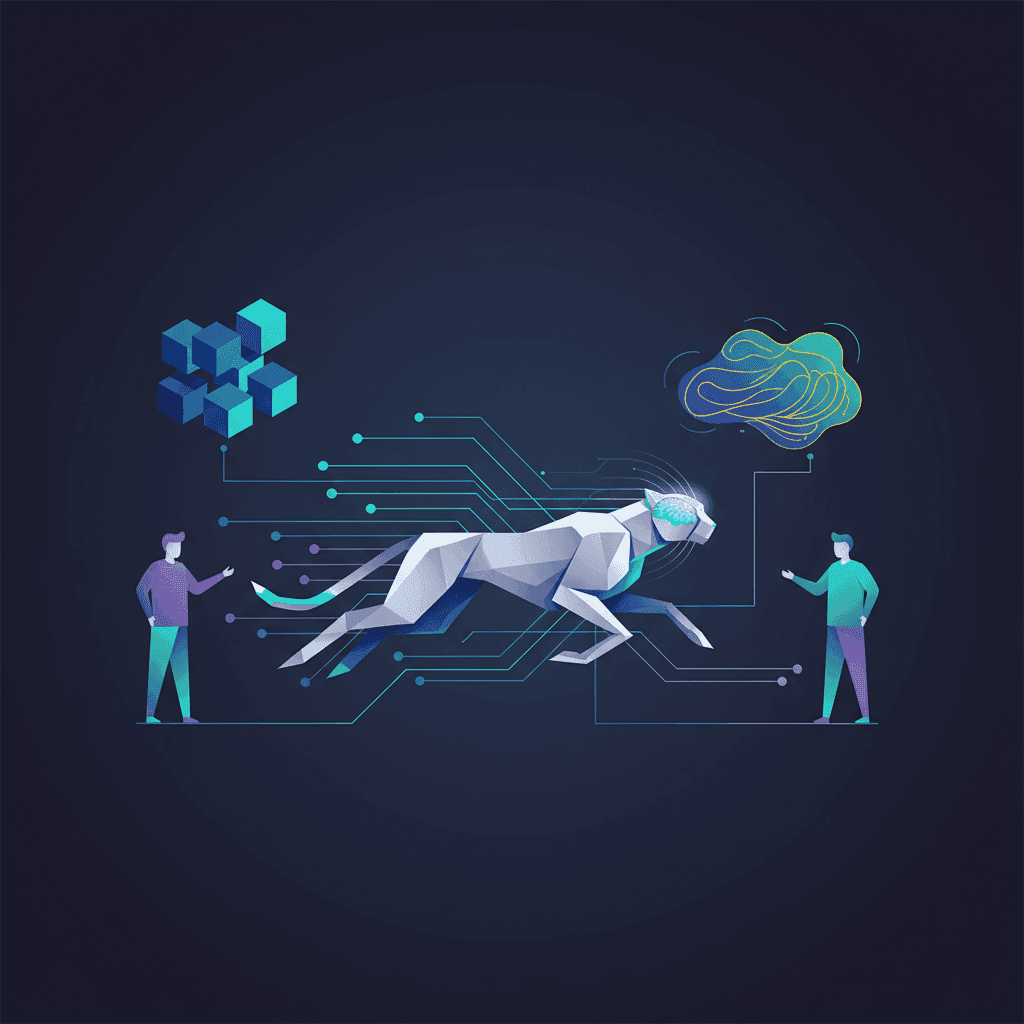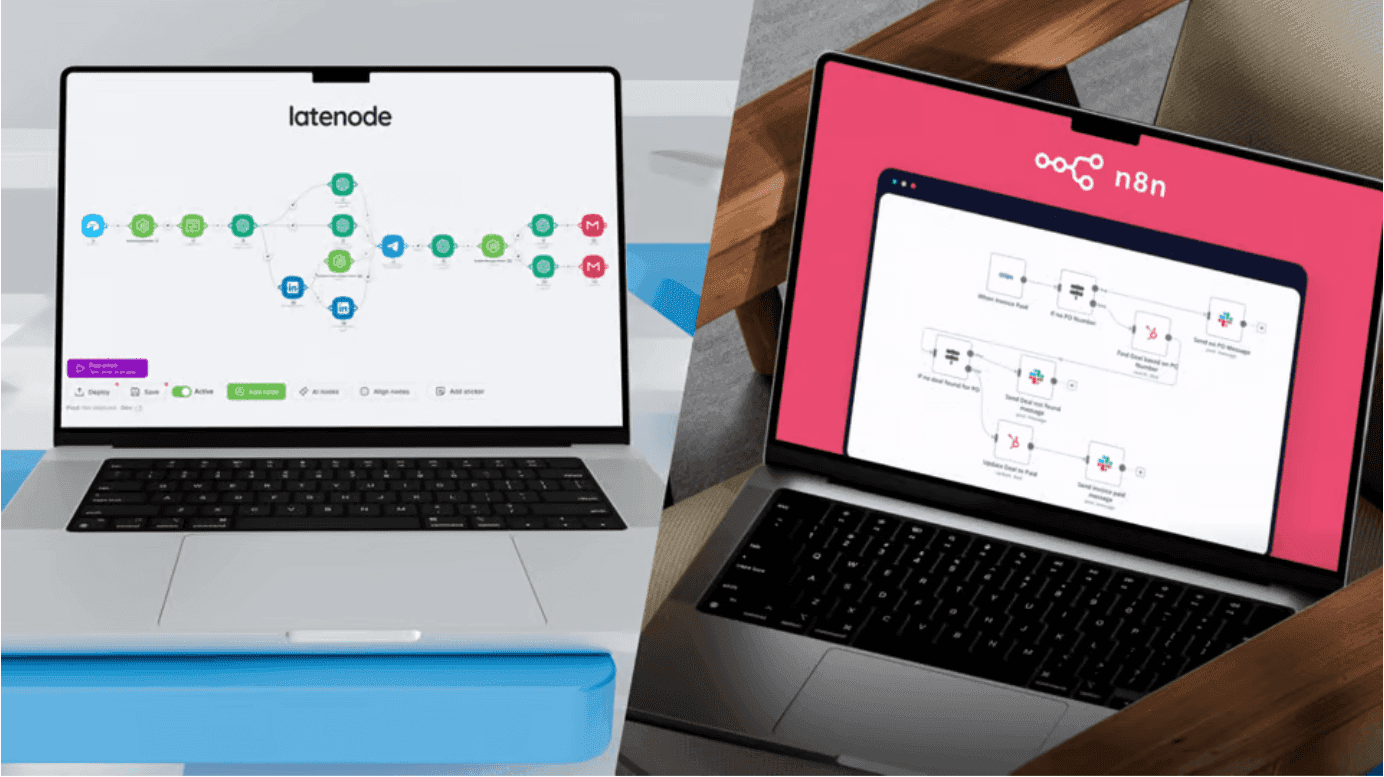Low-Code iPaaS Benefits for Agile Marketing Teams with Latenode
Explore how Latenode's low-code iPaaS, with its No-Code/Low-Code Builder and AI Copilot, empowers non-technical marketing teams to independently automate complex workflows and achieve greater agility.

Modern marketing demands speed that traditional IT queues can't deliver. Low-code iPaaS platforms like Latenode transform this bottleneck by empowering marketing teams to build sophisticated automations independently—without writing code or waiting for developer resources. Gartner research shows that by 2025, 70% of new applications will use low-code or no-code technologies, highlighting the massive shift toward democratized automation. Latenode's AI-native platform goes beyond simple connections, offering a visual no-code builder with advanced AI capabilities that enable autonomous, intelligent workflows. This approach lets marketing teams launch campaigns faster, personalize customer experiences at scale, and make data-driven decisions—all while reducing their dependency on IT by up to 90%.
The Critical Gap Between Marketing Speed and IT Capacity
Today's marketing landscape requires unprecedented agility. Teams must launch campaigns within hours, deliver hyper-personalized experiences across multiple channels, and pivot strategies based on real-time performance data. Epsilon's research confirms that 80% of consumers prefer personalized experiences, making responsive, data-driven marketing operations essential for business success.
Yet most marketing teams face a fundamental bottleneck: IT dependency. Every new tool integration requires a development ticket. Connecting a social media platform, setting up analytics dashboards, or automating lead routing can take weeks. The MuleSoft Connectivity Benchmark Report identifies integration complexity as a top enterprise challenge, with marketing teams particularly affected by these delays.
The alternative—custom development—presents its own problems. Development is expensive, slow, and requires ongoing maintenance. As one developer noted in a Reddit discussion, "Nothing is reliable. If your workflow needs any real accuracy, consistency, or reproducibility, these models are a liability... It's like building on quicksand." This creates what experts call the "automation gap"—where the desire to automate far exceeds the technical capacity to implement solutions.
This is precisely where iPaaS (Integration Platform as a Service) becomes transformative. An iPaaS operates as intelligent middleware, connecting disparate applications and enabling seamless data flow without custom coding. For marketers, it democratizes automation, making sophisticated workflow management accessible to non-technical teams while reducing development costs and accelerating time-to-market.
Breaking IT Dependencies Through Low-Code Automation
Low-code iPaaS platforms fundamentally reshape how marketing teams approach automation. Instead of submitting IT tickets for every integration, marketers gain direct control over their technology stack. This shift addresses a critical pain point: Zapier research shows employees spend hours weekly on repetitive tasks that could be automated, representing enormous opportunity costs for strategic marketing work.
The power lies in the visual, drag-and-drop interface. Rather than writing code from scratch—which requires specialized skills and extensive testing—marketers use intuitive workflow builders. These platforms bridge the gap between purely no-code tools (which can be limiting) and complex coding solutions (which are inaccessible to most marketers). This hybrid approach enables users to handle sophisticated logic while maintaining ease of use.
Additionally, modern iPaaS solutions run on managed infrastructure. This means automatic updates, security patches, and scaling—all handled by the platform provider. For marketing teams, this eliminates another layer of IT dependency while ensuring enterprise-grade security and reliability. SOC 2 compliance and similar standards become platform responsibilities rather than internal IT burdens.
Latenode's Visual Builder: Marketing Automation Made Accessible
Latenode distinguishes itself through its hybrid coding approach. While most marketing automations can be built entirely without code, the platform provides flexibility for advanced users to inject custom JavaScript logic when needed. This ensures scalability—teams can start simple and add complexity as their skills and requirements grow.
The platform's AI Copilot serves as an intelligent assistant throughout the workflow building process. It helps configure nodes, suggests optimizations, and even generates JavaScript snippets on demand. This addresses a common frustration among automation builders: the extensive debugging and "guardrailing" required for complex workflows. The AI Copilot makes sophisticated automation accessible even to users with zero coding experience.
For integration capabilities, Latenode offers over 600 pre-built app connections for popular marketing tools like HubSpot, Google Ads, Slack, and Notion, plus the flexibility to connect any service via custom API calls and webhooks. Marketing teams working with platforms like HubSpot's CRM and marketing APIs, Google Ads API, or Facebook's Graph API can create seamless data flows and campaign orchestration. The Latenode + Notion integration exemplifies this flexibility, allowing teams to connect project management with automated workflows effortlessly.
AI-Powered Speed and Scale for Marketing Operations
For marketing teams, velocity is everything. Automating manual tasks like data entry, social media content scheduling, and report generation can reduce campaign launch times from days to hours. McKinsey's research on generative AI suggests that advanced AI capabilities can boost productivity significantly and add trillions in value across business functions, with marketing being a prime beneficiary.
Latenode accelerates marketing operations through several key innovations:
Real-World Marketing Transformations with Latenode
The practical applications of low-code iPaaS in marketing operations demonstrate significant business impact. HubSpot research shows that companies excelling at lead nurturing generate 50% more sales-ready leads at 33% lower cost, while email marketing and paid search benchmarks provide KPI baselines that automated workflows consistently improve.
Here are proven marketing automation scenarios delivering measurable results:
For teams looking to build practical skills, datasets like the UCI Bank Marketing dataset or various marketing campaign datasets on Kaggle provide excellent practice grounds for developing lead scoring and personalization workflows.
Competitive Advantages in the Growing iPaaS Market
The iPaaS and low-code automation market is experiencing explosive growth. MarketsandMarkets projects significant growth in the sector through 2025 and beyond, driven by enterprises' digital transformation needs. Statista's low-code/no-code adoption data confirms this trend across industries, with businesses prioritizing platforms that reduce IT dependency while accelerating innovation.
What distinguishes Latenode in this competitive landscape? Latenode's 2025 platform analysis reveals several key differentiators: advanced ETL capabilities, intelligent metadata management, AI-powered workflow orchestration, and enterprise-grade scalability—all delivered with transparent pricing and minimal IT involvement required.
This positions Latenode not merely as an iPaaS, but as a comprehensive AI-driven automation platform that evolves with team sophistication. Third-party reviews consistently rate Latenode highly for API management, integration capabilities, and workflow rule flexibility—critical factors for marketing teams managing complex, multi-channel operations.
Frequently Asked Questions
A: Yes. Latenode's visual workflow builder requires no coding knowledge, while the AI Copilot provides guidance for complex configurations. Most marketing automations can be built using drag-and-drop components and pre-built templates.
A: Latenode's credit-based pricing typically saves teams $40-60 monthly compared to managing separate subscriptions for automation tools plus AI services. The platform includes 400+ AI models that would otherwise require individual API accounts.
A: Most teams can build their first automation within 15-30 minutes using templates. The visual interface and AI Copilot significantly reduce the typical learning curve associated with workflow automation platforms.
A: Latenode offers 600+ pre-built integrations covering major marketing tools like HubSpot, Google Ads, Salesforce, Mailchimp, and Slack. Custom integrations are possible via API calls and webhooks for any tool with an API.
A: Latenode's multi-agent systems and RAG capabilities ensure consistent, reliable performance. The platform's managed infrastructure and enterprise security standards make it suitable for production marketing operations.
A: Latenode provides comprehensive documentation, video tutorials, pre-built templates, and an AI Copilot that offers real-time guidance. The platform is designed for self-service success with extensive learning resources.
A: The platform maintains enterprise-grade security with SOC 2 compliance, automated security updates, and robust data protection measures. Marketing teams can automate workflows while meeting strict compliance requirements.
Conclusion: Transforming Marketing Through Intelligent Automation
Low-code iPaaS platforms represent more than convenience for marketing teams—they're transformation enablers that unlock unprecedented operational independence and strategic focus. By democratizing automation and integration capabilities, these platforms close the critical gap between marketing's need for speed and traditional IT capacity constraints.
Latenode's unique combination of visual workflow building, native AI integration, and enterprise reliability positions it as the ideal solution for modern marketing teams. Unlike fragile custom implementations or feature-limited simple automation tools, Latenode enables the creation of comprehensive, intelligent systems with the consistency and sophistication that agile marketing demands.
Key Takeaways:
By embracing Latenode's AI-native automation platform, marketing teams can finally redirect their energy from repetitive manual tasks to creative strategy development and campaign innovation—driving the kind of agile, data-driven marketing that today's competitive landscape demands.
Join our community and follow us on LinkedIn for the latest product updates, automation tips, and success stories.



